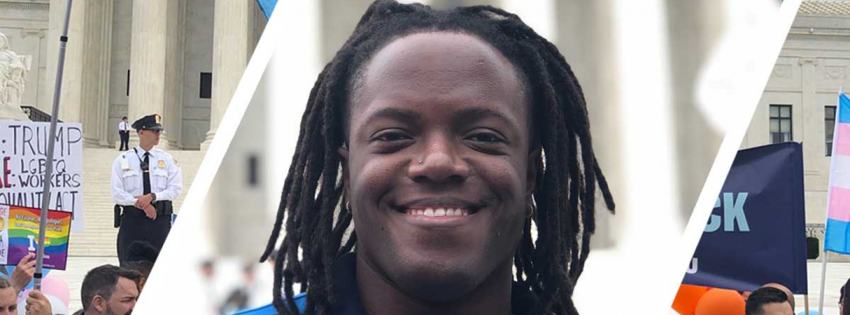
We Must Stop Forcing Conformity on Intersex Bodies
A core aspect of human autonomy and dignity is to be able to make decisions about our own bodies. But each year, doctors around the country continue to perform medically unnecessary, harmful surgeries on intersex infants and children, just to “normalize” their bodies. What this means is that doctors are forcing infants and young children to undergo medically unnecessary genital surgery simply to force their natural bodies to conform to traditional societal—and binary—views of “male” and “female” bodes.
These irreversible surgeries are increasingly considered a violation of human rights and can lead to a lifetime of trauma, physical pain, loss of genital sensitivity, incontinence, scarring, sterilization, or incorrect gender assignment. Yet they are often justified solely by the adult fear of the child being stigmatized by a perceived nonconforming body.
Instead of forcing conformity, we should celebrate our differences. October 26th marks Intersex Awareness Day. On this day—and every other day of the year—the ACLU stands with intersex people and allies throughout the country and world to protect and advance the fundamental human rights and civil liberties of intersex people.
-Elizabeth Gill

INTERSEX PEOPLE ARE LEADING THE WAY
Intersex Awareness Day is about reminding the world that intersex people exist and in many different variations. It gives us a platform to educate and to acknowledge the intersex advocates, like myself, who fight for the social equity and bodily autonomy of intersex people.
When I was growing up, I began growing facial and body hair at the same time that I was growing boobs and having my first period. I was constantly misgendered and couldn’t figure out why I was being told that I was a “normal girl” by my family and my doctors when I didn’t look like any of the girls in my class. None of them had Adam’s Apples or beards.
I was born with congenital adrenal hyperplasia, CAH for short. This means that my body doesn’t produce enough cortisol, a stress hormone our bodies need to function properly, and to compensate, my body naturally produces higher levels of testosterone. Testosterone produces what we typically refer to as “secondary male characteristics.”
I also had an enlarged clitoris and my urologist assured me that undergoing a vaginoplasty to make my genitals appear more “normal” would enable me to be able to “use” my vagina. I don’t know why he assumed to know about how I would or would not want to “use” my vagina.
I didn’t know how the surgery was going to be performed. My urologist told me that I might lose sensation as a result, but I remember not knowing what that meant and feeling too embarrassed to ask. I now understand what it meant and looking back I realized that this should have been a much larger conversation than it was. What he should have said was that my ability to feel pleasure during intercourse could be compromised because of the surgery. All patients deserve that kind of transparency. Luckily, this was not the case for me, but it is for many other intersex individuals.
These high-risk and irreversible surgeries are performed to conform our bodies to gender expectations, often with patients having little or no say in this personal decision to determine what, if any, treatment or surgery is appropriate for us. They may be well-intentioned, but these surgeries are oftentimes carried out with the assumption that this is what children would want as adults.
In my case, I never did “use” my vagina the way the doctor assumed I would because most of my intimate partners have been cis gender women. Instead of preparing me for a penis, my urologist could have affirmed that there was nothing wrong with my intersex body.
Fortunately, earlier this year, California State Senator Scott Wiener introduced a bill that would help preserve options for children born with natural variations in their sex characteristics by delaying medically unnecessary surgeries until patients can participate in these personal decisions and determine what treatment or surgery is right for them.
SB 201 would allow patients to make informed decisions about their own bodies. When I had the procedure, I hadn’t had enough life experiences to make an informed decision about what was being done to my body, even though I’m the one that has to suffer the consequences, not my parents and not my doctors.
If passed, the bill would give patients the power to drive conversations about surgery, not doctors. If I could go back, I would do more research on my urologist and find out how much experience he’s had performing these surgeries successfully. I wish I could have asked more personal questions about how surgery might affect my sex life and romantic partnerships. These are important questions that parents might be too embarrassed to ask or might not think to ask, but answers that patients should have the right to know.
There are no proven risks in delaying these surgeries, but a 2017 report by Human Rights Watch found that non-consensual surgeries caused trauma and shame in intersex patients, instead of preventing them. It’s time to center care on the needs of patients themselves.
-Bria Brown-King
To learn more, visit interactadvocates.org.
Elizabeth Gill is a Senior Staff Attorney with the ACLU of Northern California and the National ACLU’s LGBT & HIV Project. Bria Brown-King is a Communications intern with interACT and a graduate student at Bay Path University.
